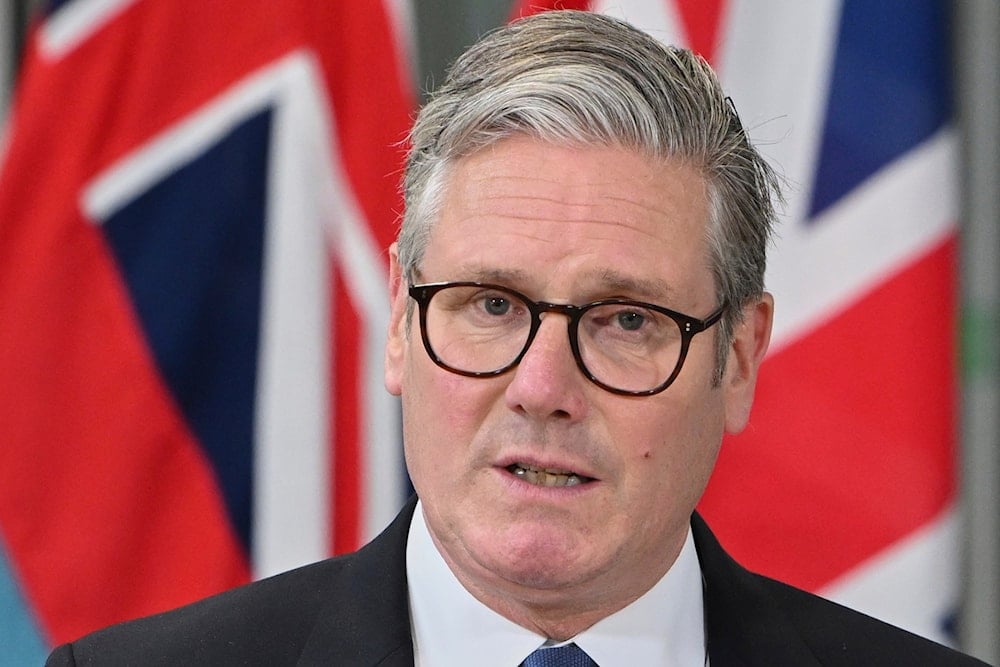UK considers sanctions on Ben-Gvir, Smotrich over 'Gaza crisis'
Britain's consideration stems from growing calls to act on war crimes and humanitarian concerns ravaging the Gaza Strip.
-

Britain's Prime Minister Keir Starmer speaks during a press conference at a military headquarters in north-west London, Thursday, May 22, 2025, following a deal on the Chagos Islands. (AP, pool)
The British government is seriously considering imposing sanctions on two far-right Israeli ministers, Itamar Ben-Gvir and Bezalel Smotrich, amid mounting pressure over "Israel’s" actions in Gaza, The New York Times reported.
The move signals a significant potential shift in the UK's Gaza policy and reflects how deeply the humanitarian crisis has begun to reshape diplomatic attitudes.
Although the sanctions proposal originated under the previous Conservative government, the momentum behind it has accelerated under Prime Minister Keir Starmer, the NYT noted.
According to several officials interviewed, a final decision has yet to be made as debates continue within Whitehall.
Gaza humanitarian crisis intensifies pressure on Starmer
Public outrage and internal political pressure have increased, especially after Britain joined France and Canada in condemning the expansion of "Israel’s" military operations.
Even the United States, once unwavering in support of "Israel", appears less resistant, with US President Donald Trump expressing frustration and calling to “stop that whole situation as quickly as possible.”
However, the fatal shooting of two Israeli embassy staff in Washington by a pro-Palestinian activist has complicated the timing, according to the NYT.
The paper further emphasized that British officials now appear inclined to wait for a measurable increase in aid to Gaza before deciding whether to blacklist Ben-Gvir and Smotrich, both of whom have advocated positions that constitute violations of international law.
Legal, diplomatic caution slows UK policy shift
Foreign Secretary David Lammy has used some of the strongest language to date from a British official regarding "Israel’s" conduct, describing remarks by Smotrich about “cleansing” Gaza as “monstrous” and “repellent".
Still, Lammy refrained from using the term "genocide", despite growing demands from Labour backbenchers and civil society.
This hesitation reveals a division between the more forward-leaning Foreign Office and a cautious 10 Downing Street, the NYT highlighted, adding that Starmer’s legal background, coupled with Attorney General Richard Hermer’s growing influence, plays a role.
Hermer was instrumental in the UK’s decision not to oppose the ICC’s arrest warrants for Israeli leaders Benjamin Netanyahu and Yoav Gallant.
Lawyers , lawmakers amplify demands for sanctions
Meanwhile, 800 British legal professionals, including two retired Supreme Court justices, signed an open letter demanding sanctions. The letter accuses "Israel" of war crimes and argues that the situation in Gaza meets the threshold for genocide, especially given the military blockade and limited humanitarian access.
The growing calls for accountability, echoed across the Labour Party, place Starmer in a delicate position. However, the prime minister’s international law commitments may soon come into direct conflict with his political caution.
The NYT also pointed out that Britain is also weighing whether to formally recognize an independent Palestinian state, a step already taken by Spain, Norway, and Ireland. While France has reportedly encouraged a coordinated announcement at an upcoming June summit, British officials remain divided on its immediate impact.
As a matter of fact, Netanyahu’s sharp criticism of Starmer, Macron, and Canada’s Prime Minister Carney has only underscored the growing isolation of the Israeli regime. In a video message, Netanyahu accused them of siding with “mass murderers and baby killers,” in rhetoric dismissed by many European leaders as increasingly unhinged.
A turning point in Starmer’s foreign policy?
The UK is approaching a critical juncture, according to the NYT. Even German Chancellor Friedrich Merz has condemned "Israel’s" actions in Gaza, while Trump’s shifting tone could open new diplomatic space. With images from Gaza continuing to dominate global media, Starmer may find that caution is no longer a politically sustainable posture.
The decision over whether to impose sanctions on Ben-Gvir and Smotrich and potentially recognize Palestine will likely define the Starmer government’s legacy on international justice.

 4 Min Read
4 Min Read










